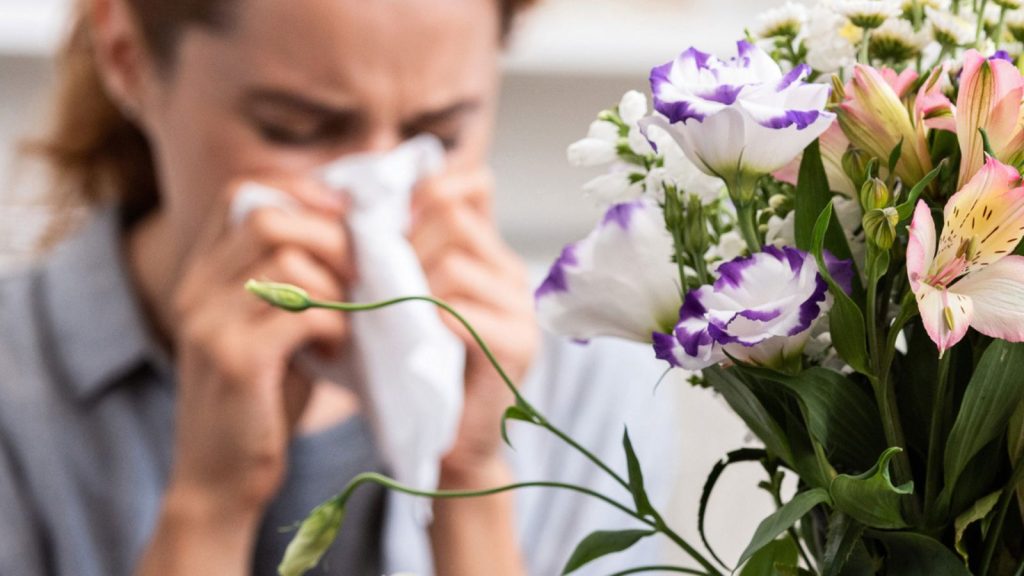June 18-24 is an important week for many of us (nearly 1 in 5 people to be specific), it’s Allergy Awareness Week.
Allergy Awareness Week aims to raise education and, hence the name, awareness about allergies, with 2023’s focus being managing allergic diseases amidst environmental changes.
From pollen to pets to peanuts, we investigate:
- What allergies are exactly
- Common allergies in Australia
- Signs you may have an allergy that you don’t know about
- Tips for dealing with allergies
To uncover this important information, we’ve enlisted the help of Territory Medical’s Dr Sara Martin.
Dr Sara Martin has a special interest and additional training in allergic disease, which includes childhood and adult allergic diseases and the recognition and management of common allergic conditions among patients and medical practitioners.
“Allergies come in all kinds of severity, from serious, even fatal in some cases, to minor annoyances,” explains Dr Martin.
“Allergy symptoms often change over time as we age, so staying in the know of your specifics is an important part of health and wellbeing.”
Book an appointment with Dr Martin today.
What allergies are exactly
“Some reactions seem like swatting a fly with a bazooka.”
Allergies refer to the body’s hypersensitive response to certain substances that are usually harmless to others.
When an individual with an allergy comes into contact with an allergen, such as pollen, dust mites, pet fur, certain foods, or insect venom, their immune system reacts more than other people.
This is why some people are allergic to peanuts for example, when their friends or family aren’t.
Dr Martin confirms that allergic reactions are a defence mechanism.
“Put simply, if you have an allergy, your immune system mistakenly identifies these substances, allergens, as harmful invaders and initiates a defensive response, releasing chemicals like histamine into the bloodstream.
“Some reactions seem like swatting a fly with a bazooka.”
This immune reaction can lead to a wide range of symptoms, including sneezing, coughing, itching, hives, nasal congestion, watery eyes, and in severe cases, difficulty breathing or anaphylaxis.
Allergies can significantly impact a person’s quality of life, and effective management often involves identifying and avoiding triggers, as well as taking medications or immunotherapy to alleviate symptoms.
Common allergies in Australia
“Other people rely on over-the-counter medication which can be both ineffective and expensive.”
Us Aussies love the outdoors, a varied diet and our pets, and as such, allergies certainly aren’t uncommon.
Australia is known for its diverse flora and fauna, but this attraction can also contribute to a wide range of common allergies.
Pollen allergies, particularly to grass and flowers in spring and summer, are prevalent across the country, with hay fever symptoms often occurring during these seasons.
Dust mite allergies are another common concern, as these microscopic creatures thrive in warm and humid environments found in many Australian homes.
Venomous insect bites and stings can trigger severe allergic reactions. Stings from bees, wasps, and ants can cause anaphylaxis, a severe condition that can have potentially life-threatening symptoms such as breathing and/or heart symptoms.
Food allergies are also on the rise, with peanuts and other nuts, shellfish, prawns and other seafood, and dairy being among the most frequent culprits.
Many of us also develop allergies to animals, specifically from cats, dogs, and horses.
Recognising these common allergies is crucial for early diagnosis and management, enabling you to take appropriate precautions and seek necessary medical care.
The best bet in Australia
“Some people are unaware they have an allergy, or assume they do because they had what appeared to be a reaction in the past that could have been something else.” Says Dr Martin.
“Other people rely on over-the-counter medication which can be both ineffective and expensive.
“Proper diagnosis and management tailored to your condition is the correct and effective way of enjoying your life without fear of allergic reactions.”

Signs you may have an allergy that you don’t know about
Signs that you may have an allergy can vary depending on the type of allergen and your response or symptoms.
Sneezing
One common sign is persistent sneezing, especially when exposed to certain triggers like pollen, dust, or pets.
Eyes
Itchy or watery eyes are another hallmark symptom of allergies.
Nose
Nasal congestion and/or a runny nose are also common, causing discomfort and difficulty in breathing through the nose.
Coughing
Allergies can also manifest as a persistent cough, which may be dry or accompanied by mucus production.
Skin
Skin-related symptoms are common indicators of allergies. Itchy skin, hives (raised, itchy welts on the skin), or eczema (dry, inflamed, and itchy patches) can all be signs of an allergic reaction.
Stomach pain
Abdominal pain, bloating, diarrhoea, or vomiting may occur after consuming certain foods if there is a food allergy present.
Severe reactions
More severe allergic reactions can involve respiratory symptoms like wheezing, shortness of breath, or chest tightness, which can be indicative of asthma or anaphylaxis, a potentially life-threatening reaction.
If you experience any of these signs, a medical evaluation and allergy testing can determine the specific allergens triggering your symptoms.
“Sometimes, people write off allergic reactions as being ‘under the weather’, or having a cold.” Explains Dr Martin.
“But often, a simple allergy test and the correct medication or management can mean they don’t have to deal with those symptoms.”
Tips for dealing with allergies
ONE: Identify and Avoid Triggers
Identify the allergens that trigger your symptoms and take steps to minimise exposure to them. This may involve keeping windows closed during high pollen seasons, using allergen-proof covers for bedding, and regularly cleaning surfaces to reduce dust mites.
TWO: Maintain a Clean Living Environment
Regularly clean your home to remove allergens such as dust, pet fur/dander, and mould. Vacuum carpets and furniture using a vacuum cleaner with a HEPA filter, and even use an air purifier if you’re particularly allergic.
THREE: Monitor Pollen Levels
Stay informed about pollen forecasts in your area, and try to limit outdoor activities during times when pollen counts are high. If you do need to go outside, wearing sunglasses and a hat can help protect your eyes and face from pollen.
FOUR: Practise Good Hygiene
Wash your hands frequently, especially after coming into contact with potential allergens. Avoid rubbing your eyes, as this can further irritate them.
Shower and change your clothes after spending time outdoors to remove any allergens that may have attached to your hair or clothing.
FIVE: Use Medications
Over-the-counter antihistamines, nasal sprays, and eye drops can help alleviate allergy symptoms but consulting with a health professional is often the most effective way to deal with reactions.
It’s important to follow the recommended dosage and consult with a healthcare professional if symptoms persist or worsen.
SIX: Consult with a Professional
If your allergies are significantly impacting your quality of life or over-the-counter medications are not providing sufficient relief, a professional can help.
They can perform allergy testing, provide personalised treatment plans, and offer options like immunotherapy (allergy shots) for long-term management.
Allergy awareness at the end of the day
Taking even a few of the tips above onboard can really make a difference if you’re dealing with an allergy.
“There’s almost always a solution to allow someone with an allergy to live life to the fullest.” Says Dr Martin.
“We regularly see people commenting how they should have taken an allergy test in the first place, rather than using off-the-shelf medication, or even dealing with symptoms alone.
“There’s simply no need to let allergies impact your quality of life.”
If you find yourself or someone close to you dealing with a symptom described above, get in touch with Dr Martin today and ensure you’re on the best management plan per your circumstances.

